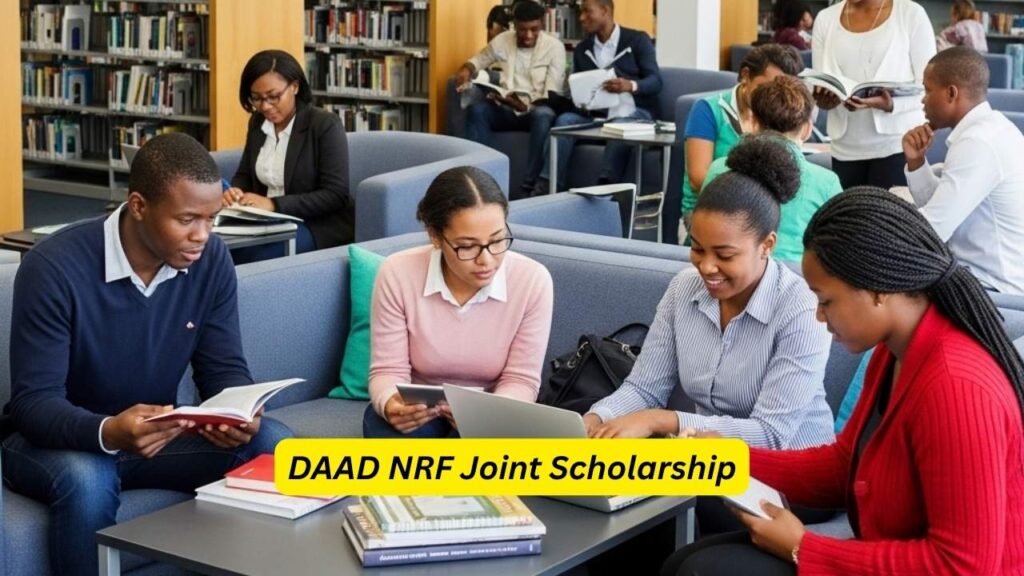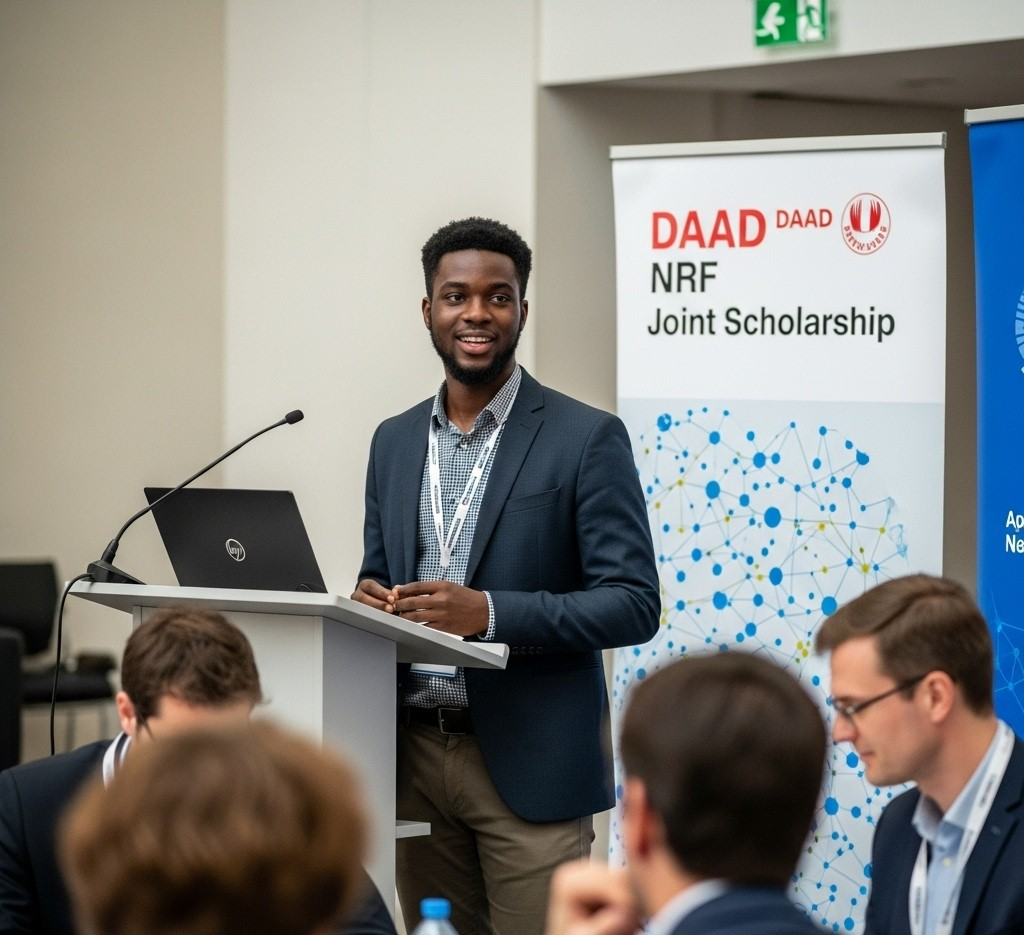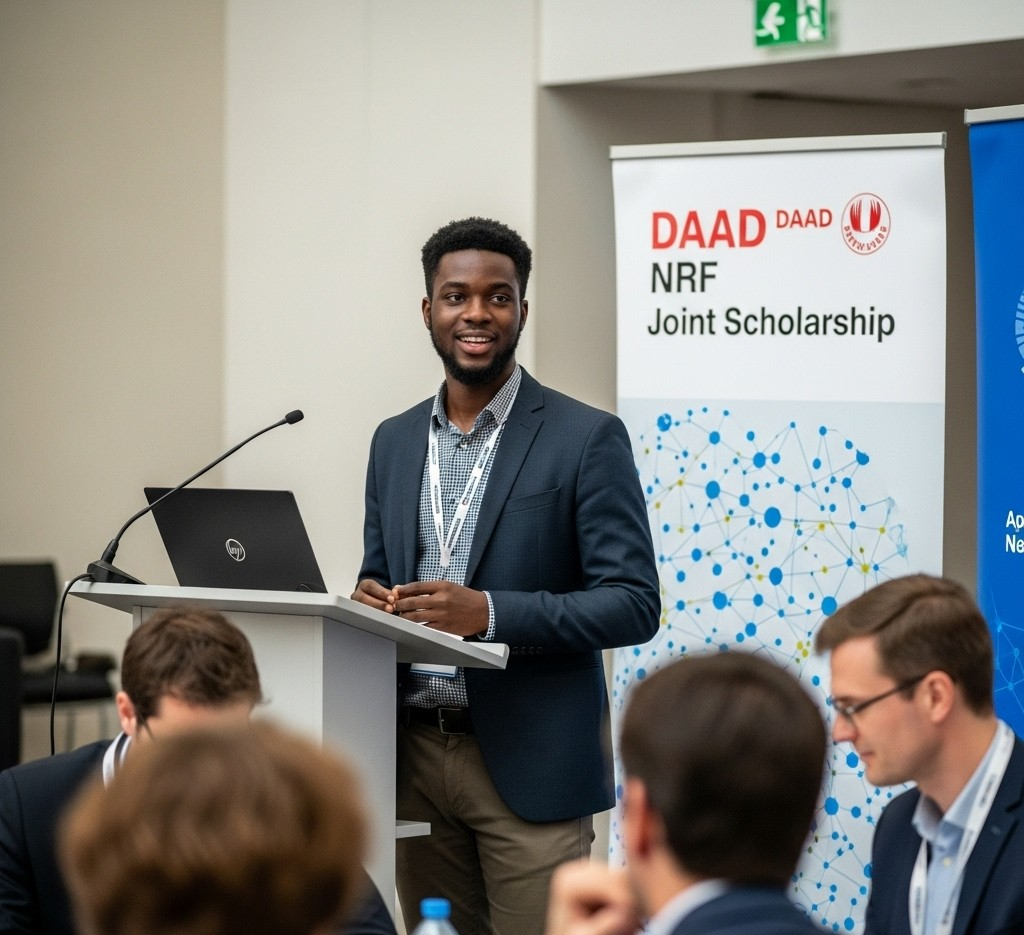Are you dreaming of advancing your postgraduate studies, perhaps even pursuing a PhD, with the support of a prestigious international scholarship? If so, the DAAD NRF Joint Scholarship is a name you’ve undoubtedly encountered, and for good reason. It represents a golden opportunity for talented individuals to achieve their academic aspirations. The exciting news is that the DAAD NRF Joint Scholarship Board is still accepting new applications, offering a clear path to fully funded postgraduate programs. Navigating the scholarship landscape can feel overwhelming, but I’m here to assure you that with the right guidance, clarity, and proactive steps, this exceptional opportunity is well within your reach.

DAAD NRF Joint Scholarship at a Glance
| Key Fact | Detail/Statistic |
| Eligibility | Primarily for South African citizens/permanent residents, often encouraging female applicants. |
| Study Level | Master’s and PhD studies in South African public universities. |
| Funding Duration | Up to 2 years for Master’s, up to 3 years for PhD. DAAD-NRF Joint Scholarship Programme South Africa |
| Key Benefit | Fully funded, often includes mobility grants for research visits to Germany. |
| Application Submission | Exclusively through the NRF Connect system. General Application Guide 2025-2026 – NRF |
The DAAD NRF Joint Scholarship is more than just a scholarship; it’s a strategic partnership designed to cultivate the next generation of academic and professional leaders. The fact that the DAAD NRF Joint Scholarship Board is still accepting new applications is a clear invitation to take the next step in your academic journey.
Understanding the DAAD NRF Joint Scholarship: Your Gateway to Excellence
The DAAD NRF Joint Scholarship Programme is a remarkable collaboration between the German Academic Exchange Service (DAAD) and the National Research Foundation (NRF) of South Africa. Its core objective is to bolster postgraduate training in fields crucial for national development, fostering skilled university staff and public sector professionals. This program is specifically designed to support Master’s and PhD studies within public South African universities, with an added, highly valuable component: the potential for a short-term research visit to Germany.
In my experience advising students, one common hurdle is understanding the specific nuances of joint scholarships. Unlike some standalone scholarships, the DAAD NRF Joint Scholarship integrates the strengths of both organizations, providing comprehensive support and a unique international dimension.
Who Can Apply for the DAAD NRF Joint Scholarship?
The scholarship primarily targets South African citizens and permanent residents. While applications are open to all eligible candidates, female applicants are often strongly encouraged, aligning with broader goals of promoting diversity in academia.
Beyond citizenship, academic excellence is paramount. While specific requirements may vary slightly with each call, generally, applicants for Master’s funding need a minimum average of 65% for all subjects at the honours level (or equivalent), and doctoral applicants need a minimum average of 65% for their Master’s degree. For “exceptional achievers,” this threshold can be higher, often 75% or more DSI-NRF Postgraduate Student Application and Funding Framework for Funding in 2023 Academic Year. It’s crucial to refer to the specific call for applications on the NRF website for the most up-to-date and precise eligibility criteria.
The Benefits: More Than Just Funding
Receiving the DAAD NRF Joint Scholarship goes far beyond financial support; it’s an investment in your future. Successful Master’s candidates typically receive ZAR 80,000 per annum, while PhD candidates receive ZAR 110,000 per annum DAAD-NRF Joint Scholarship Programme South Africa.
Beyond the monetary value, the scholarship often includes:
- Mobility Grant: A significant highlight is the opportunity for a short-term research visit (typically 3-6 months) to Germany. This allows scholars to engage with German academic institutions, access world-class facilities, and broaden their research networks.
- Summer Schools: Participation in interdisciplinary summer schools in Germany is often part of the program, offering invaluable learning and networking experiences.
- Networking Opportunities: Scholars are frequently invited to an annual networking conference in South Africa, hosted by the DAAD Information Centre Johannesburg, connecting them with a vibrant community of fellow scholars and experts NRF DAAD Scholarship and Fellowships – The VALIDATE Network.
These benefits collectively create a holistic development experience, equipping you with not only academic prowess but also global perspectives and professional connections.

Navigating the Application Process: Your Step-by-Step Guide
The application process for the DAAD NRF Joint Scholarship is streamlined and primarily handled through the NRF Connect system. It’s essential to understand that applications must be submitted via NRF; applications sent elsewhere will not be considered DAAD-NRF Joint Scholarship Programme South Africa.
Here’s a breakdown of the typical application journey:
1. Stay Informed: The Annual Call
The annual call for the DAAD NRF Joint Scholarship is usually published on the NRF’s website, typically starting from June each year DAAD-NRF Joint Scholarship Programme South Africa. Keep a close eye on the NRF website’s funding and bursaries section. It’s also often found on the DAAD Information Centre Johannesburg website.
2. Deep Dive into the Call for Applications
Once the call is released, read it meticulously. Every detail matters, from specific eligibility criteria to required documents and submission guidelines. This document is your roadmap. Pay close attention to any internal deadlines set by your chosen institution, as these can precede the NRF’s final cut-off date.
3. Register on NRF Connect
Applications are submitted electronically via the NRF Connect system. If you haven’t already, you’ll need to register for an account. Ensure all your personal and academic details are accurate and up-to-date.
4. Prepare Your Documents
This is where thoroughness pays off. While the exact list can vary, common documents include:
- Academic Transcripts and Certificates: Official records of all your previous academic achievements.
- Motivation Letter: This is your chance to shine! Articulate your academic and career goals, why you’re interested in your chosen program and university, and how the DAAD NRF Joint Scholarship will help you achieve your aspirations. I’ve seen many successful applicants focus on a compelling narrative that links their past experiences to their future ambitions and the scholarship’s objectives.
- Research Proposal (for PhD applicants): A clear, concise, and compelling outline of your proposed research project. This should demonstrate originality, feasibility, and relevance to national development.
- Curriculum Vitae (CV): A detailed overview of your academic and professional history, including any publications, presentations, or relevant work experience.
- Letters of Recommendation: Strong letters from academic supervisors or employers who can speak to your abilities and potential are invaluable.
- Proof of Language Proficiency: While the DAAD NRF Joint Scholarship often doesn’t have strict German language requirements for in-country scholarships, for programs in Germany or those taught in English, you might need TOEFL or IELTS scores Frequently Asked Questions (FAQs) Content – DAAD. Always check the specific program requirements.

5. Online Submission
Upload all required documents to the NRF Connect system. Double-check that all files are correctly formatted and uploaded. An incomplete application will not be considered. After submission, you typically won’t be able to make changes unless your institutional Designated Authority (DA) reopens it for revisions.
6. The Selection Process
Final selection is made by a panel comprising university professors and representatives from both the NRF and DAAD. Successful candidates are informed through the NRF.
Pro Tip for Your Motivation Letter: Crafting Your Narrative
Your motivation letter is your voice. It’s not just a recounting of facts but an opportunity to tell your story. Why this scholarship? Why this field of study? What impact do you envision your research having? Connect your personal journey, academic interests, and future aspirations to the core objectives of the DAAD NRF Joint Scholarship. Make it personal, passionate, and persuasive.
Success Stories and Inspiration
The DAAD NRF Joint Scholarship has a long history of empowering individuals to make significant contributions to their fields and communities. Scholars have gone on to lead major research initiatives, contribute to national development, and become influential figures in their respective sectors.
For instance, the story of Sumita Ramgareeb, who headed a leading research program at the South African Sugarcane Research Institute after her DAAD scholarship, showcases the profound impact these opportunities can have More than just scholarships … – DAAD. These are not just individual triumphs but testaments to the power of investing in human potential.
Don’t miss out on insights from official sources!
Innovate Water Solutions: Fully Funded PhD Opportunities at KIT, Germany
PhD Scholarship Position 2025 in Soil Science at Leibniz University Hannover
FAQ
Q1: Is there an age limit for DAAD NRF Joint Scholarships?
A: Generally, there isn’t a fixed age limit for DAAD scholarships. However, some programs, including certain NRF opportunities, might stipulate that only a certain amount of time should have elapsed since your last degree. For the NRF component, typical entry age requirements are 28, 30, and 32 years for honours, master’s, and doctoral studies respectively, in the year of application DSI-NRF Postgraduate Student Application and Funding Framework for Funding in 2023 Academic Year. Always check the specific call for applications for precise details.
Q2: Do I need to know German to apply for the DAAD NRF Joint Scholarship?
A: For the DAAD NRF Joint Scholarship, which primarily supports in-country studies in South Africa with a mobility grant to Germany, German language proficiency is typically not a strict requirement for the main scholarship. However, for research visits to Germany or if you choose a program there, English proficiency (TOEFL/IELTS) would be required, and some German language skills might be beneficial for daily life and integration Frequently Asked Questions (FAQs) Content – DAAD.
Q3: Can I apply for multiple postgraduate courses with this scholarship?
A: When applying for other DAAD scholarships, you can often apply for up to three courses, listing them in order of priority. You would typically need one motivation letter explaining your interest in these specific courses. For the DAAD NRF Joint Scholarship, applications are submitted through NRF for studies within South Africa, so you’ll need to align with the NRF’s application guidelines regarding course choices and university affiliations. Always consult the official NRF call for proposals for specific instructions on applying to multiple programs.
Q4: What are the key factors for a successful DAAD NRF Joint Scholarship application?
A: Based on my observations, successful applicants typically demonstrate strong academic performance, a clear and compelling research proposal (for PhD), a well-articulated motivation letter that connects their aspirations to the scholarship’s objectives, and strong letters of recommendation. Demonstrating relevance to national development and a genuine desire to contribute to your field are also crucial.










